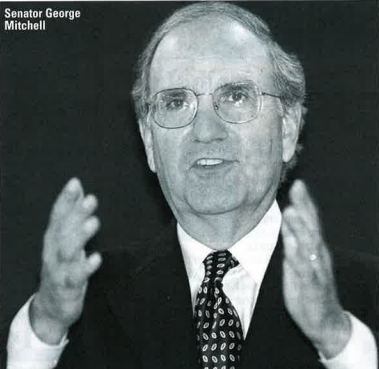The pendulum continued to swing between optimism and pessimism in Northern Ireland at the time of going to press, with the main political parties still in talks and Senator George Mitchell poised to release his long-awaited report on the state of the peace process.
Mitchell, hailed by commentators of all the persuasions for his role in securing the Good Friday Agreement, flew back to the North in September to chair a review on the implementation of the Agreement. Progress on the document had stalled when unionists and republicans failed to agree on two key points: a timeframe for setting up the new Executive and the issue of decommissioning.
Speaking in early November after a marathon talks session which lasted several days, the senator said he believed that all parties to the Agreement wanted “to see it happen.”
At the time of going to press, the former Maine senator had held talks with the Irish Taoiseach (Prime Minister) Bertie Ahern and was preparing to meet with British leader Tony Blair and U.S. President Bill Clinton. He was also scheduled to meet with General John de Chastelain, chairman of the International Commission on Decommissioning.
Announcing a short adjournment in the talks process, Mitchell said he was convinced that both the Ulster Unionists and Sinn Féin wanted decommissioning.
He said: “On the basis of these intensive discussions, conducted over a period of nine weeks, I am convinced that these parties are sincere and acting in good faith in seeking the full implementation of the Good Friday Agreement. They want devolution and decommissioning. The problem, of course, is that there are differences among the parties on how those objectives can be achieved.”
Sinn Féin president Gerry Adams said he believed there was only a “slim and limited” chance of republicans and unionists reaching agreement. He also warned of the danger that the process would become so drawn out that people would become “increasingly detached.”
Ulster Unionist Reg Empey, standing in for party leader David Trimble who was in the U.S., said it was understandable for people to be skeptical about the chances for success, but added: “What are the alternatives to what we have to do? We have got to work at this.”
Bertie Ahern also sounded a cautious note of optimism saying he was hopeful that Senator Mitchell, with the three governments’ assistance, could “bring this across the line.” Added Ahern: “I don’t know whether that is going to be possible. I am heartened that Senator Mitchell will, I think, stay through until he completes his work.”
If Mitchell’s arrival back in Belfast was the welcome return of a familiar face, there were mixed emotions in October at the departure of an equally well-known player from the scene. Northern Ireland Secretary of State Mo Mowlam was recalled to Britain for a new position in Tony Blair’s Labor administration.
Politicians paid tribute to Mowlam, who had both enraged and endeared people to her during her 30 months in office. The frequently unconventional minister was praised by SDLP leader John Hume for her “outstanding” contribution to peace during her term in office. Many unionist politicians weren’t quite so generous, with some saying they weren’t sorry to see her leave.
Mowlam said she would miss her post but felt that her replacement, Peter Mandelson, would prove to be a “very safe pair of hands.” Most observers were adopting a “wait-and-see” approach to the changeover. Mandelson has had his own problems in the past; he resigned from Tony Blair’s cabinet last year after it was revealed that he had secretly accepted a £373,000 loan from a cabinet colleague.
For his part, President Clinton managed to ruffle more than a few feathers with his remarks in early October that both sides in Northern Ireland were like “a couple of drunks” who couldn’t quite manage to leave the bar.
While many politicians and observers in Ireland expressed outrage at his remarks, there was an even stronger consensus that while the President’s analogy was an unfortunate choice of words, his sentiment was wholly understandable.
The SDLP said in a statement that Clinton’s remarks were “obviously off the cuff” but “reflected the reality that the president, like so many of us, is justifiably frustrated with the slow pace of progress in implementing the Good Friday Agreement in full.”
There was predictable outrage from DUP leader Ian Paisley, and a no comment from the Ulster Unionists, led by David Trimble. President Clinton issued a terse apology hours following his remarks, which were made at the dedication of a new U.S. embassy in Ottawa, saying he regretted his “inappropriate” metaphor.♦


Leave a Reply